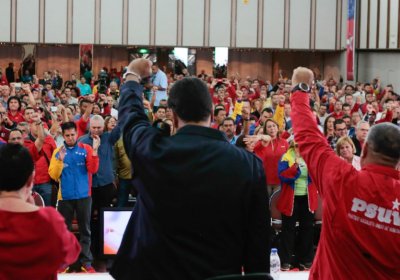Amid the COVID-19 pandemic, the United States’ “maximum pressure” campaign against Venezuela continues to intensify, writes Yanis Iqbal.
Bolivarian revolution
Venezuela is confronting COVID-19 amid foreign sanctions, mercenary incursions and rising incidents of looting and riots. Green Left’s Federico Fuentes speaks to National Network of Commune Activists spokesperson Atenea Jiménez about the situation on the ground.
The Venezuelan Armed Forces and the National Bolivarian Police repelled two attempted invasions by mercenaries on May 3 and 4, writes Kerry Smith.
Venezuela is winning the war on COVID-19, writes Nelson Dávila, despite being subjected to inhuman economic sanctions by the US and its European allies.
Below are three statements from the Socialist Alliance (Australia), the Socialist Party of Malaysia (PSM) and the Philippines-Venezuela Solidarity (Phil-Ven-Sol).
US Hands off Venezuela!
By Socialist Alliance National Executive
January 24, 2019 — The Socialist Alliance strongly condemns the actions of the United States President Donald Trump in backing an attempted coup against the democratically elected government of Venezuela.
There is a growing body of pro-establishment statements in the United States opposing the possibility of US military intervention in Venezuela, writes Steve Ellner.
The latest expression of this position is a New York Times editorial titled “Stay Out of Venezuela, Mr. Trump”, published on September 11.
At first glance the editorial is a welcome statement that counters the careless war-mongering declarations coming from the ilk of Marco Rubio and a number of high-ranking Trump administration officials, as well as Donald Trump himself.
Representatives of 74 communes — institutions of popular power elected from grassroots communal councils — from across Venezuela gathered in Lara state late last month to participate in the inaugural National Assembly of Communes, writes Paul Dobson.
The meeting of more than 300 commune activists was held to try to strengthen the connections between different communes in a range of areas. This includes linking up productive micro-projects, communicational initiatives and educational networks.
Daniel Gasparri, the Charge d’affaires at the Embassy of the Bolivarian Republic of Venezuela, was welcomed here at a 60-strong dinner on August 26, hosted by the Communist Party of Australia.
Venezuelans braced themselves as a series of long-anticipated economic measures came into effect on August 20, including the launch of a new paper currency called the Sovereign Bolivar.
The new currency brings with it a revaluation of all prices, wages and pensions, which will be cut by five zeros. Both the old Strong Bolivar and Sovereign Bolivar will co-exist for a period of time yet to be announced by the government.
Venezuela was rocked on August 5 by an attempt to assassinate President Nicolas Maduro during a public event, using drones armed with explosives.
The fourth national congress of Venezuela’s largest political party, the United Socialist Party of Venezuela (PSUV), wound up on July 30 following three days of intense activities. The congress was inaugurated on July 28, on the 64th birthday of the party’s late founder, Hugo Chavez.
The PSUV congress took place in an increasingly complicated context, amidst a collapsing economy, hyperinflation, international financial sanctions and an upcoming monetary reconversion.
A large contingent of Venezuelan campesinos marched across the country for almost three weeks in what they called the “Admirable Campesino March” to raise awareness about the many problems faced by small farmers, including evictions, harassment and general neglect at the hands of government institutions.
The marchers, who first set off on July 12 from the city of Guanare, Portuguesa state, arrived in Caracas on August 1 with the plan to deliver a collective document that presents both their complaints and proposals to President Nicolas Maduro.
- Previous page
- Page 2
- Next page











